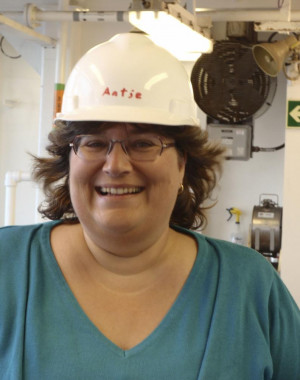Antje received her diploma in Marine Geology in 1993 from the University of Kiel (Germany) and her Doctorate of Natural Sciences (DSc/PhD) in 1999 from the same university. After her PhD she was contracted first as a postdoctoral fellow and then as an associated scientist by the Leibniz Laboratory for Radiocarbon Dating and Isotope Research in Kiel. In 2001 she moved to Portugal where she has worked since; first as a postdoctoral fellow and later as a researcher. In Portugal she has led 4 research projects (PORTO, INTER-TRACE, MOWCADYN, Iberia-Forams) and participated in numerous others. She supervised 2 PhD students, 3 MSc dissertations, 1 Bachelor thesis student and one visiting early career researcher from Brazil. She currently supervises 1 PhD student, is an Advisory Panel member of a PhD student at the University Vigo (Spain), and co-supervises 1 post-doc at Peking University (China). She is an active member of the international scientific community, collaborating with numerous scientists from around the world, regularly reviewing manuscripts for high-ranking journals and evaluating project proposals for funding agencies in Europe, Israel, USA, and New Zealand. She is currently an editor for the journal Quaternary Science Reviews and represents Portugal in the International Ocean Discovery Program (IODP) in the ECORD Science Support and Advisory Commnittee (ESSAC). Since June 2020 she serves in the IODP Science Evaluation Panel (SEP-Science). In May 2022 she also became a national delegate in the CCEG working group of OSPAR.
By training she is a paleoceanographer with expertise especially in stable isotope data (foraminiferal carbonate, modern sea water) and planktonic foraminifers (fauna, biostratigraphy), but has also worked on radiocarbon dating and tephrastratigraphy. She, furthermore, uses foraminiferal trace element records and grain-size data for paleo-reconstructions. Currently, her research is focused on understanding centennial-to-orbital scale climate variations (Greenland stadial/interstadial cycles; abrupt climate change during glacials/ climate transitions; interglacial variability) and their impact on the thermohaline circulation (surface, intermediate, deep water) and climate in general.
She is working on time intervals ranging from the recent past to the middle to early Pleistocene (300-1800 ka/ 0.3-1.8 Ma) and the Pliocene (3.5 – 4.6 Ma) and in geographic/hydrographic regions spanning from the polar Nordic Seas and Labrador Sea down to the subtropical gyre and intends to expand into the South Atlantic in the next years.
Within the scope of the GEOTRACES program and a proposed SCOR working group, she is analysing the stable isotope (H, O, C) values of seawater and relates them to the modern hydrographic conditions.


